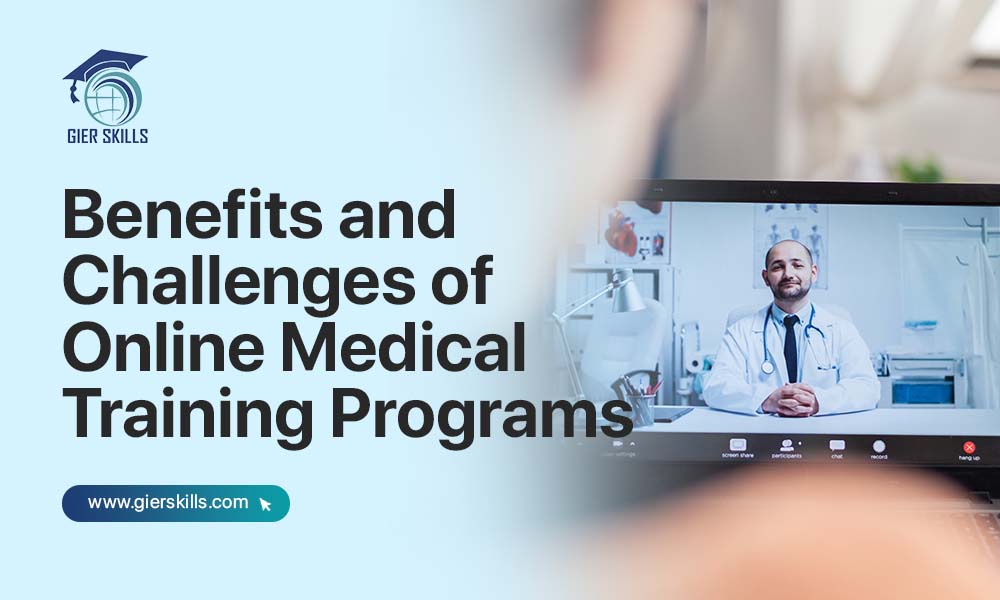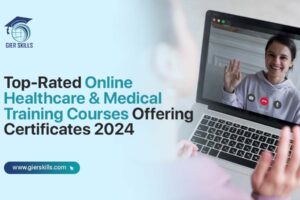
Benefits and Challenges of Online Medical Training Programs
- Posted by GIER Skills
- Categories Blog
- Date February 9, 2024
- Comments 0 comment
The global spread of COVID-19 prompted the closure of educational institutions worldwide, testing their readiness to handle crises necessitating advanced technology, including hardware and software, for effective online learning. This closure accelerated the development of online learning environments to ensure uninterrupted learning. Many institutions like GIERSkills, an online skill development training institute began exploring optimal methods for delivering course content, engaging learners, and conducting assessments.
Online learning systems are web-based platforms for distributing, tracking, and managing courses online. They utilize technological advancements to direct, design, and deliver learning content while facilitating communication between students and faculty. These systems feature tools like whiteboards, chat rooms, polls, quizzes, and discussion forums, enabling online interaction and content sharing. Institutions institutions utilize platforms such as Microsoft Teams, Google Meet, Edmodo, and Moodle, along with video conferencing applications like Zoom, Skype for Business, WebEx, and Adobe Connect.
This blog moves through the advantages of medical education and how online skill development training provider like GIERSkills overcome the challenges of providing education through online learning systems efficiently.
Advantages
E-learning began in the 1990s when computers became common. During the 2020 pandemic, online learning became even more popular as people stayed home. This made many organizations, including healthcare, use digital education to train employees.
So, what are the benefits of medical training programs? If you want to know why online medical courses are popular and consider using them for your organization, here are four key advantages of digital training.
Accessible Anywhere, Anytime
Medical training programs offer unparalleled convenience. With online healthcare industry training, professionals can access courses from any location with a stable internet connection. This flexibility allows them to engage in learning from the comfort of their homes, eliminating the need for travel. Moreover, virtual learning environments negate the necessity for dedicated meeting rooms or offices for training sessions.
Furthermore, digital courses empower staff to learn at their own pace. They can delve deeper into topics they find challenging and revisit materials for review whenever needed, promoting comprehensive understanding and flexibility in learning.
Staying Up to Date
For healthcare professionals, evolving industry standards and regulations demand constant vigilance. Online training offers a seamless solution by enabling swift updates to course content, ensuring alignment with the latest medical protocols and technologies. This agile approach helps staff stay abreast of developments, fostering compliance and enhancing the quality of patient care across the facility.
Better Management
The benefits extend beyond healthcare providers; administrators also find it easier to track staff training progress. With data stored in a cloud-based database, access becomes streamlined, allowing management to monitor efficiently and free up time for other responsibilities.
Moreover, online courses alleviate paperwork burdens. By centralizing training and records digitally, organizations reduce physical documentation, leading to enhanced organization and efficiency.
Provides Personalized Learning
Online medical training programs elevate the level of customization in courses. Through e-learning tools, content can be tailored to meet the unique requirements of various departments. This ensures that staff members concentrate on topics most relevant to their roles.
Challenges
Lack of Skills
The primary obstacle in online teaching is the lack of technical proficiency. Insufficient computer and writing skills have fostered a negative stance among professors towards e-learning, hindering effective online instruction. This deficiency may impede students’ development of essential clinical skills, potentially impacting their mental well-being.
Time Management
Even before the onset of the pandemic, professors encountered difficulties in efficiently managing their time to cover the curriculum adequately. The abrupt shift from traditional classroom instruction to online teaching demanded extensive time and effort from faculty and staff. Teachers had to allocate time to enhance their technical competencies, adapt content designed for in-person instruction to suit online delivery, address technical glitches, and devise methods to engage students in virtual lectures. This increased workload disregarded the personal lives and mental well-being of educators. Similarly, students struggled to juggle multiple online classes, grappling with varying lecture durations and scheduling gaps dictated by faculty availability.
Infrastructure Limitations
In regions with medium to low-income demographics, the lack of infrastructure poses a significant obstacle to successful online education. Financially disadvantaged students may lack access to smart devices such as laptops, tablets, and smartphones required for online learning. Despite progress in internet accessibility and affordability in India, geographical constraints persist, limiting internet access for students who have relocated due to the pandemic. According to the “Digital in India” report of 2019, internet access was available to 54% of the urban population and 32% of the rural population aged 12 and above. Additionally, medical schools in low and middle-income countries face challenges related to limited digital resources and the capacity of frontline healthcare professionals to develop online teaching materials.
Poor Communication Across Levels
The successful implementation of online learning hinges on effective communication among institutions, organizations, online skill development training centres, departments, faculty, and students. Inadequate support and inter-departmental communication may result in scheduling conflicts and overload for students, hindering concentration and understanding of medical education.
Negative Attitudes Towards Technology
Resistance to new technologies among students and teachers presents a significant challenge. Technical difficulties exacerbate educators’ feelings of inadequacy, hindering the effective adoption of online learning methods.
Student Engagement Challenges
Maintaining student focus in online classrooms can be challenging due to external distractions and limited communication channels. Without adequate technical skills, effective online communication between teachers and students is impeded.
Assessment Strategies
Assessing student competencies in online settings requires innovative approaches. Formative assessments, including case-based quizzes and practical examinations, should be prioritized over summative evaluations. Online assessment tools and virtual patient simulations offer effective means of evaluating cognitive and psychomotor competencies.
In conclusion, despite the myriad challenges facing online medical education, viable solutions exist like the training development centres GIERSkills did. E-learning offers unique advantages over traditional learning methods. Ongoing efforts to address barriers and leverage the potential of online education promise a transformative impact on medical education.
How Online Medical Courses Are Taught Efficiently by GIERSkills?
After each session, we gather feedback from students and faculty which is crucial to enhance ongoing online teaching. Online questionnaires facilitate this process, covering aspects like session timing, teaching tools, challenges faced, and strategies for overcoming them. Timely analysis of this feedback enhances the effectiveness of online teaching and learning.
Despite the barriers of online education on the CBME curriculum, online skill development courses with certifications offer advantages over traditional methods. We encourage educators to acquire new skills and cooperate to maximize online content delivery efficiency. Educators motivate students to actively participate in the online learning process, to adapt to this new system of online medical education.
Conclusion
The abrupt shift of medical education from traditional classrooms to online platforms presents distinct challenges for both faculty and students. Adapting to new platforms for content delivery adds pressure on educators to prepare and deliver material effectively. Challenges such as skill gaps, inadequate infrastructure, and time management issues can be addressed through initiatives like skill development training centres such as GIERSkills. To safeguard the medical education system, integrating CBME principles into e-learning is crucial. Collaboration among institutions, educators, and students is essential to ensure the resilience of the healthcare system post-pandemic. Despite challenges, the momentum of online medical education in India is growing, driven by its advantages and stakeholder efforts to sustain it during the pandemic.
Frequently Asked Questions (FAQs)
What barriers affect the development and implementation of online learning in medical education?
The findings indicate that several obstacles hinder the development and execution of online learning in medical education. These barriers encompass time limitations, insufficient technical proficiency, inadequate infrastructure, lack of institutional strategies and support, and negative attitudes among all stakeholders involved.
How can medical schools adapt to online education?
Amidst the transition to online education, medical institutions must be ready to cultivate a thriving educational atmosphere for students. This involves prioritizing tech-driven teaching methods, providing guidance, and encouragement, soliciting feedback from medical students, and supporting educators in adapting to the evolving landscape.
Is online medical certificate valid in India?
Although many Indians rely on hard copies, companies like medicalcertificate.in can issue medical certificates online after consulting with patients. Such certificates, endorsed by a valid government medical practitioner, hold validity and are recognized by both government and private entities.
How to verify Medical Council of India (MCI) certificate online?
Authenticate your Medical Council of India (MCI) certificate online. Users can confirm details by choosing the certificate type (provisional or permanent) for Indian or foreign qualifications and entering the certificate number.
Is online learning a viable option for medical education?
The research conducted in Khyber Pakhtunkhwa examined the viability of online learning among students, trainees, and faculty members. Findings indicated favourable technology access, proficient online skills, and readiness for online discussions among participants throughout the medical education journey.




